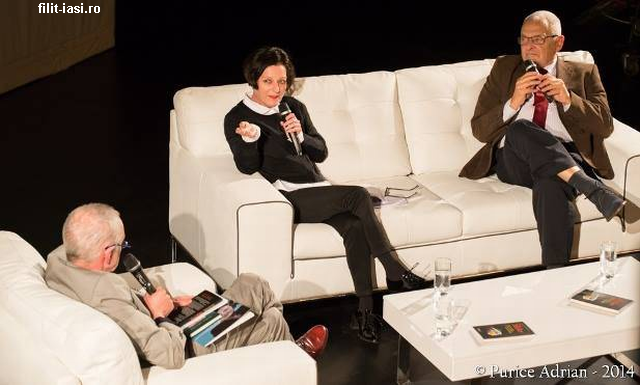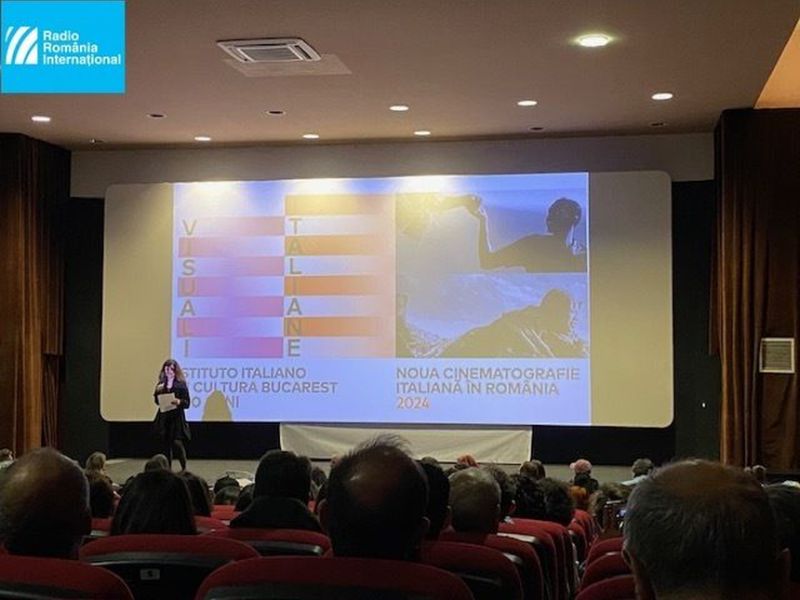Herta Muller
Nobel winner Herta Muller was the guest of the Literature and Translation Festival in Iasi

Corina Sabău, 22.11.2014, 14:06
Herta Muller, a Romanian-born German writer and winner of the Nobel Prize for Literature in 2009, was the special guest of the International Literature and Translation Festival recently held in Iasi, north-eastern Romania. Joining Herta Muller for the event were writer and journalist Ion Vianu and translator Ernest Wichner, the director of Literaturhaus in Berlin, who also acted as host of the panel discussion on the festival agenda.
It was in 2010 that Herta Muller last spoke before a Romanian audience, when Romanian writer Gabriel Liiceanu invited her to the Romanian Athenaeum, so the debate held as part of the International Literature and Translation Festival in Iasi came as a surprise for all those attending it. We recall that four years ago emphasis was laid on politics and resistance and Herta Muller did not hesitate to retort to Liiceanu, criticising most of the Romanian intellectuals, whom she accused of being passive during the communist regime. At the International Literature and Translation Festival in Iasi this year, however, Herta Muller mainly spoke about literature and even read from her recent volumes translated into Romanian.
Herta Muller began to be persecuted by the former Securitate after refusing to collaborate with the then political police and also because she befriended some of the Aktionsgruppe Banat society members.
In 1982 Herta Muller made her debut with the short fiction volume, Nadirs, published by Kriterion Publishers and brought out by Humanitas Publishers in Bucharest in 2012. The book was to a great extent censored and would also be published in West Germany in 1984. Herta Muller’s work was banned in Romania in 1985. The growing pressure coming from the former Securitate prompted Herta Muller to emigrate to Germany in 1987, and she has been living in Berlin ever since.
The evening dedicated to Herta Muller at the International Literature and Translation Festival in Iasi started with the author reading from her most recent volume, “The Appointment” published Humanitas. In a nutshell, the novel is the story of a young woman who simply wouldn’t give up on happiness, in the totalitarian mayhem. It is a novel with a great evoking power, also displaying a rugged force of words turning into poetry and beauty, being also one of the most important novels by the Romanian-born German author. In her novel, Herta Muller gives an exceptional and deeply touching insight into how dictatorship ends up completely taking hold of the human soul. Critics have agreed that “The Appointment” jointly with two other novels “The Passport” and “The Land of Green Plums” make up a trilogy, because of their common theme. Herta Muller:
“Critics say it’s a trilogy. I’m not so sure about that, though. There are indeed three books, but I did not plan to write a trilogy. It just happened that I wrote these books one after another. That’s because in a way I couldn’t find peace and there were things that were still haunting me. I was devastated when I left Romania, I couldn’t think about anything else. The first years were particularly difficult, as I knew the Ceausescu regime was still in power. There were so many people I cared about and I knew they were in danger of experiencing the same terrible things that I had gone through and that they had no chance to escape as I did. I had all these things in mind so I did not think about dealing with any other subject. I couldn’t have, even if I wanted to.”
“We do not pick the subjects, the subjects pick us”, Ion Vianu said, and Herta Muller went on to explain:
“There is this category of writers – and Ion Vianu is one of them, who went through a lot and it was impossible for them to stay unharmed. Aleksander Soljenitsin’s case was mentioned, which is highly relevant in this respect. There are people who survived wars, concentration camps and the gulag. Half of the world’s libraries contain books depicting such ordeals. There are books by people who did not pick their own topics. The topics were so virulent that writers were practically forced to dwell on them. So it was the theme that handled me and not the other way around.”
Writer Ion Vianu said the following about Herta Muller’s literature:
“What fascinates me about Herta Muller’s manner of writing is the extraordinary complexity of feelings. There is a very acid and ironic side to her writing, alongside a sad, grim, yet graceful one. There are also references to love and colour, all being wrapped in a kind of humour. Herta Muller’s fiction is not only sombre, but also funny. And this complexity makes Herta Muller a great writer, one of my favourite writers in the whole world. Her style is full of colourful metaphors, because she was in direct contact with life and grasped its nuances.”
The 2009 Nobel Prize for literature went to Herta Muller, who, ”with the concentration of poetry and the frankness of prose, depicts the landscape of the dispossessed.”





























